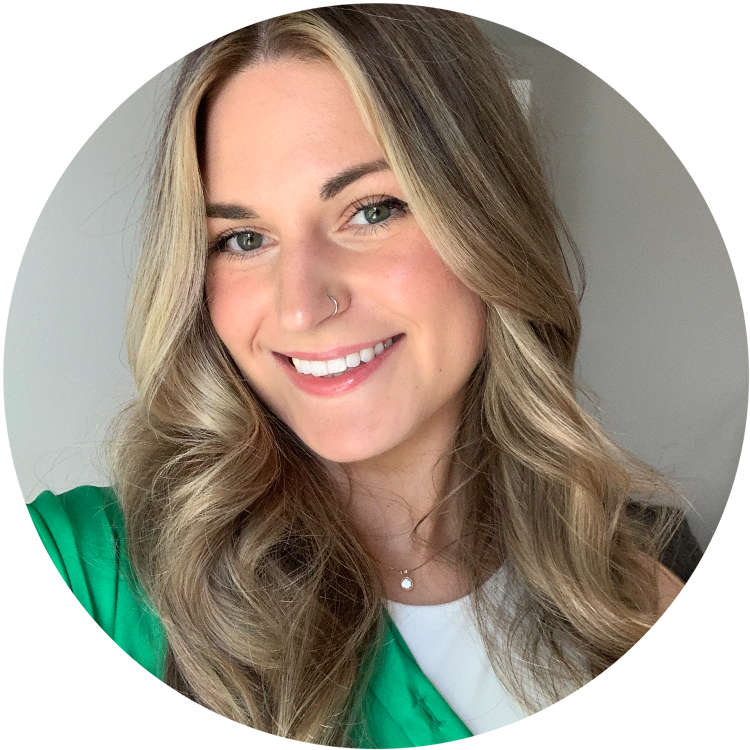
Janea Hay
Janea Hay is a student at Capilano University graduating with her Bachelor of arts degree in psychology. While completing her degree Janea works part time as a community support worker for youth with developmental and intellectual disabilities. After graduation Janea plans to continue to be an advocate for individuals with disabilities and provide support for youth.
Introduction
As of 2019 1 in 50 youth were diagnosed with Autism spectrum disorder (ASD) making up 2% of all children and youth in Canada (Public Health Agency of Canada, 2022). Autism spectrum disorder (ASD) is a neurodevelopmental disorder often characterized by finding social interaction challenging, language difficulties, repetitive behaviours and extreme interest in specific topics (Hodges, 2020). Autism spectrum disorder is noted to be more prevalent in males however it is more difficult to diagnose females with autism as it can present itself in different ways, resulting in a large number of females not getting diagnosed for years if at all (Public Health Agency of Canada, 2022). It is important to note that there is not one distinctive explanation of how autism presents itself in individuals therefore it is more accurate to look at autism as a spectrum in which each person is unique (Hodges, 2020). Challenges with social connection can be seen in the form of difficulty initiating and holding conversation, understanding social cues and maintaining eye contact, all of which are involved in the formation of relationships, making this area extra challenging. I will be arguing that to enhance the wellbeing of individuals with ASD, we have a responsibility as a society in helping provide the adequate resources to mitigate obstacles in the way of pursuing romantic relationships. To substantiate my work, I conducted two interviews, first I interviewed a peer from highschool who is on the autism spectrum and has expressed wanting to get into the dating world. Second, I interviewed Jennifer Cook, an expert in the autism field from the Netflix show “Love on The Spectrum U.S”. Research shows that individuals on the autism spectrum experience higher rates of psychological disorders such as depression, anxiety, suicidal thoughts, and behaviours in comparison to neurotypical young adults, therefore the need is urgent to increase wellbeing (Mournet et al., 2023). Along with the troubling increased risk of psychological disorders, people with ASD often experience a loss of life experiences and growth opportunities that are related to the lack of romantic relationships in young adulthood (Mattys, 2017). When mental health is at stake and the evidence is there to support the want and need of romantic connection, why aren’t we doing more to help this community find love?
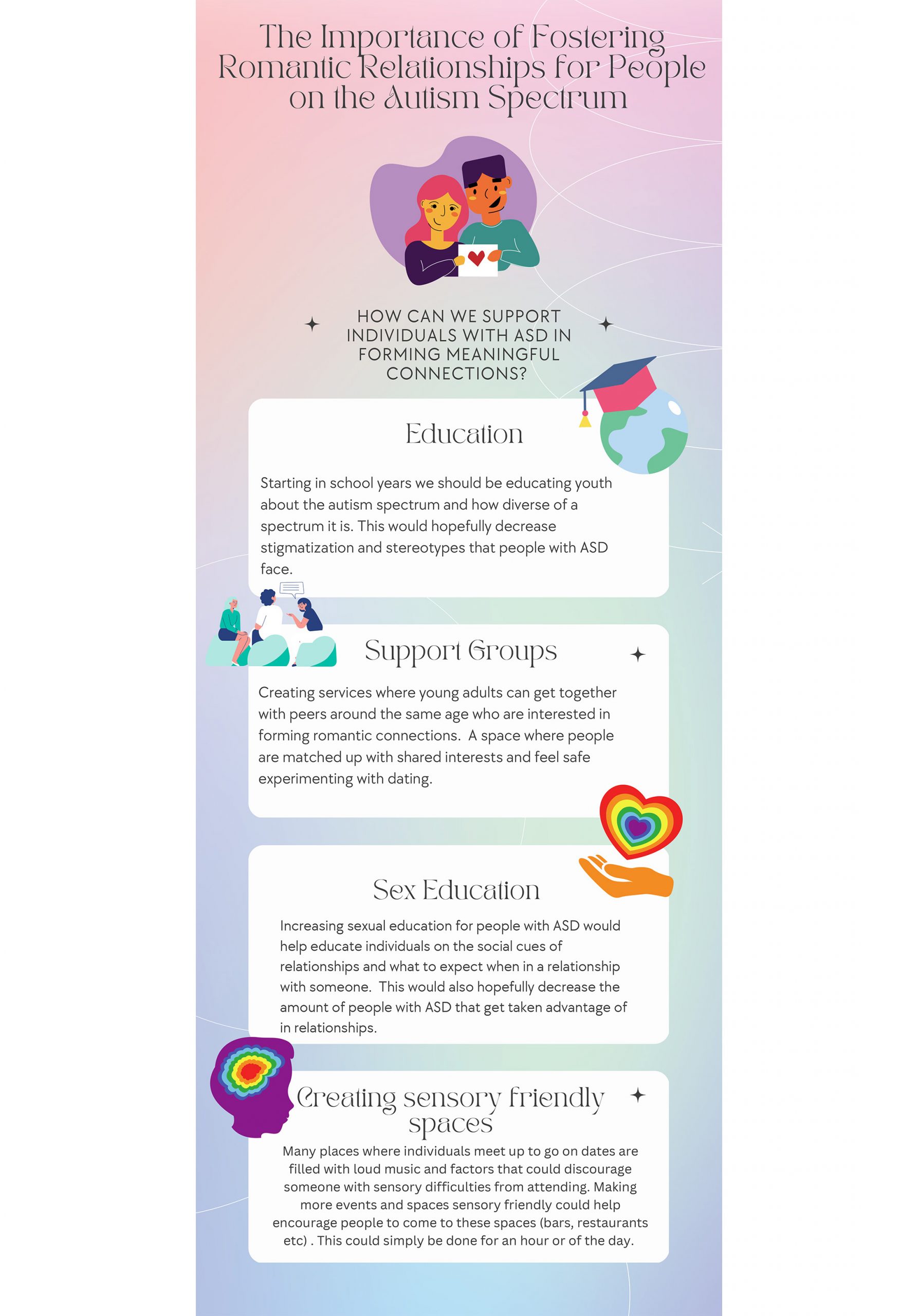
Infographic on Janea’s Personal thoughts about what could help support individuals with ASD in forming romantic relationships.
Personal Narrative
When I had my first “boyfriend” I was in kindergarten, our relationship consisted of playdates and sneaking kisses on the playground while people shouted Janea and blank sitting in a tree K-I-S-S-I-N-G first comes love, then comes marriage, then comes the baby in the baby carriage. Flashforward to now at age 22, I have been in relationships that were definitely not as lighthearted and playful as when I was a child, however the pain and experiences have helped me to develop a better sense of what I value in my relationships with others and self-respect for the way I deserve to be treated. As my mother would always say when I debriefed with her after a rough breakup, “Well… at least now you know what you don’t want!” Each relationship, whether that be a friendly one or a romantic one, has helped me grow as a person and I think that these experiences are essential for creating and maintaining personal boundaries with oneself. When I was old enough, I began to feel pressure to join dating apps as everyone else seemed to be using them, I learnt very quickly that you need to be careful with who you talk to and maybe eventually go on a date with. It is not as easy as meeting on the playground and baking cookies together anymore, the internet is full of people who do not always have your best interests in mind so using dating apps and dating in general involves exercising caution and understanding the risks involved. However, in my opinion the personal growth that develops over the course of relationships is a part of life that should not be overlooked. These experiences, good or bad, impact our understanding of future relationships.
Picture of Janea and her kindergarten crush awkwardly baking cookies together.
My interest in helping people on the autism spectrum develop meaningful relationships started with my love for the Netflix show Love on The Spectrum. The show differs from your typical reality dating show as it focuses on connecting individuals with various disabilities based on shared interests with the help of a relationship coach Jennifer Cook who is on the spectrum herself. As entertaining as the show is, it highlights the barriers that people with disabilities face when wanting to get into the dating world and shows how desired social connection is within this community. I have been helping support people on the autism spectrum since I was around 12 years old as I grew up in a small town where there was little support for children with disabilities. As of the present I work at the North Shore Disability Resource Centre (NSDRC) where I provide support for teens with various developmental and physical disabilities, during my time as a support worker I have witnessed a few of them expressing the desire for romantic connection. I have always thought of myself as a safe space for people to confide in and making life a little bit more bearable for others so when a peer from highschool messaged me about how he was afraid that he would be single forever and that he didn’t know where to reach out I felt obligated to see what I could do to help.
Literature Review & Primary Research
There is a common misconception that people with ASD are not interested in romantic partnerships or that they are not capable of being in these kinds of relationships, however this is far from the truth (Pellicano et al., 2022). Individuals on the autism spectrum have the same desire to experience love that neurotypical people do and people on the spectrum who are in romantic relationships describe them as being extremely fulfilling (Pellicano et al, 2022). Given that it is not a problem due to the capability to love deeply or an issue of disinterest, what is deterring people with ASD from developing romantic relationships? To gain direct insight about the challenges faced when wanting to get involved in dating. I interviewed Kourosh Ershad, a 22-year-old on the autism spectrum. Kourosh enjoys being involved in team sports and is currently pursuing acting at the University of British Columbia. During this interview, I received confirmation that it is not a problem of wanting a relationship but the initiation of finding someone with shared interests and developing the relationship that is challenging to do alone. Kourosh expressed that while he is, “Extremely proud of all his peers he graduated highschool with for being in relationships that it is difficult to watch sometimes when everyone around you seems to be dating someone and you haven’t experienced any relationships of your own.” When we spoke about what he defines as a romantic relationship Kourosh said that, “First you make a friendship with the person and get to know them, then you begin to love them and go on dates with them like to restaurants and bars.” Kourosh shared that his challenges when trying to form romantic relationships mainly stem from difficulties in interpreting social cues, for example knowing whether or not someone is interested in you or not. Having difficulties with key factors involved in dating such as starting off conversations and keeping them going along with understanding others emotions is a potential barrier for individuals wanting to get into the dating field (Pellicano et al., 2022). Other factors that are said to get in the way of this community pursuing romantic relations is the stigma and stereotypes that surround people with ASD (Pellicano et al., 2022). These barriers are a source of understandable frustration in the hunt to find a partner and can be detrimental to the wellbeing of individuals with ASD by contributing to feelings of decreased self-confidence, isolation, and depression (Pellicano et al., 2022).

Kourosh Ershad, 22 year old peer on the autism spectrum and aspiring actor.
Love on The Spectrum is a popular reality dating show on Netflix, the series follows individuals on the autism spectrum along their paths to creating romantic connections. Originally, there was only an Australian version of the show, but the popularity allowed the show to create a U.S version as well. On the show, the individuals have the support of Jennifer Cook who is an expert in autism and author, Cook is also on the spectrum herself. On the show Cook can be seen helping individuals understand social cues, dating etiquette and matching people together based on shared interests. I had the privilege of being able to interview Cook and was able to discuss my topic with her. Cook explained how before we tackle dating, we need to focus on the development of friendship first. What it really all comes down to is building and maintaining friendships as that is what sets the foundation for healthy relationships of any kind. She mentioned that when an individual has had a difficult time with forming friendships or having friendships that aren’t secure this leads to feelings of uncertainty about developing romantic relationships given the track record of friendships that didn’t succeed. The real key to the formation of connections of any kind for people with ASD is the development and practice of what Cook calls, “soft social skills” which will help with initiating and engaging in conversation with others. To establish social skills, Cook recommends acting out the scenario, for example if the individual is wanting to go on a date at a restaurant you would go through the motions of the date beforehand such as; sitting down, ordering, eating, being polite to the waiter (hopefully) and paying the bill. You can see a direct example of this sort of role-playing practice during episode three of Love on The Spectrum U.S at 24:47 Cook meets up with Subodh and discusses his dating goals and goes on to act out a typical restaurant date, which is what he desired to practice. By practicing and learning the social expectations of a date beforehand, this can help mitigate the level of stress that comes with going out on a date. Cook touched upon how the act of role-playing scenarios can also be beneficial for learning the body language of what it looks like when someone is interested which can sometimes be an area of confusion for people on the spectrum. Cook elaborates, “It often feels like you are just going through the game of life without any directions”, for people with autism this is especially the case which is why she wrote a whole book on understanding social cues. Throughout The Asperkid’s (Secret) Book of Social Rules Cook goes into depth about the hidden social expectations in everyday interactions for pre-teens and adolescents.
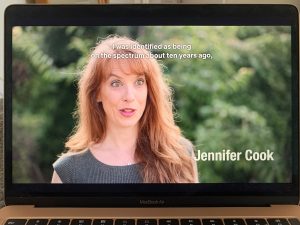
Picture taken watching Netflix’s “Love on the spectrum (U.S)” of Jennifer cook explaining when she was first diagnosed with autism.
When asked about where you can meet potential matches Cook suggested getting more activities that they are genuinely interested in, here they will have the opportunity to meet new people that have the same interests as them. Additionally Cook highlighted how changing up your regular routine is a great way to meet new people, a lot of people get somewhat stuck in their usual routines of going to the same places and seeing the same people but by starting off on your usual path you create more chances to meet someone new whether that be a friend or a potential partner. I am a culprit of this myself as I often stick to my same routine that’s comfortable to me for example going to school, gym, and home. When asked if I want to go out with my friends to a new bar I get more anxious than if we go to the same place we always go to as the potential of something new and unknown happening is greater when straying off your usual path, however this is often when the best things happen in my personal experience. There is a sweet spot in between your comfort zone and your panic zone which she describes as the, “learning zone” where you feel secure enough to experience new things but you have the skills to bring you out of the panic zone if need be, kind of like a happy medium spot of comfort.
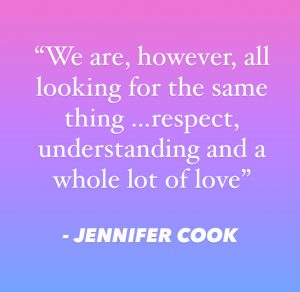
Janea’s favorite quote from autism expert Jennifer Cook.
When asked about the common misconceptions that people have about romantic relationships and people on the autism spectrum Cook stated that, “There’s the assumption that people with ASD do not desire sexual or romantic relationships, are asexual, pansexual or omnisexual.” Although that is the case for some people, she also mentioned that we should not assume this as there are a variety of reasons why someone can be uninterested such as finding romantic connections too complex that trying seems useless. Furthermore, Cook touched upon myths such that individuals with autism can’t raise a family successfully, she physically dubunks this herself as she has raised three children. Lastly, we talked about the myth that people with autism do not have sexual intercourse, if this were true there would be no adults with autism around and a large amount of people have autism and do not even know it as they never get diagnosed. The idea of people with disabilities having sexual relationships can often make people uncomfortable which is why people tend to desexualize people on the spectrum for their own consolation. Getting the opportunity to speak with Jennifer Cook was extremely eye opening for me in the way that really, the majority of people on the spectrum face issues with social connection and forming romantic relationships just like neurotypical people do. We all fix our hair and brush our teeth before a first date and stress out over what to bring up in conversation but for people on the spectrum these already challenging aspects of dating are heighted and a little support in the right direction would provide a lot of benefit.
Why is this Important?
Social Connection and Wellbeing
Wellbeing is somewhat of a subjective term as each individual describes their ideal wellbeing in a unique way. However, emphasis is placed on the five fundamental areas of wellbeing: “psychological, social, physical, emotional and physical wellbeing” (AM-HeLP, 2021). Relationships with others aid in the heightening of both psychological and social wellbeing for people with ASD (AM-HeLP, 2021). The history of why social connection is so crucial to our wellness stems from the need to survive all organisms have the need to connect with others in one way or another (Holt-Lunstad, 2021). Social connection can be understood as a protective factor which provides support and security, however on the flip side it can be detrimental to wellbeing and health at low levels (Holt-Lunstad, 2021). Knowing how critical social relationships are to overall wellbeing, it is important to discuss the implications and benefits of social connection for individuals with ASD. Research by Mournet and colleagues (2023) analyzed suicidal ideation and behaviours in people with ASD and noted that social connection is component that provided protection against such. Considering that some of the most prevalent challenges seen in ASD are related to the difficulties in connecting socially, this topic is of extreme importance for people with ASD (Mournet et al., 2023). Being on the autism spectrum is associated with higher rates of suicidal ideation and behaviours in comparison to the general population (Mournet et al., 2023). The higher prevalence of suicidal rates can be linked to difficulties in making and maintaining social connections on top of other factors (Mournet et al., 2023). Additionally young adults on the autism spectrum are at higher risk of developing psychological disorders such as depression and anxiety in comparison to the general population (Mattys, 2017).
Loss of life experiences
Furthermore, individuals with ASD are noted to experience a lower quality of life and experience a loss of life experiences when compared neurotypical young adults (Mattys, 2017). Young adulthood is a challenging period of life in general, you are in this strange place where you aren’t a child but aren’t a full blown adult yet and experiences during this time are crucial to identity formation. When most young adults are going through this phase of trial and error with life and relationships, young adults with ASD often do not get to experience the same crucial life events leading to feelings of exclusion from society (Mattys, 2017). Missing out on these valuable social relationships within young adulthood has been noted to have implications on psychosocial development and have an effect on the wellbeing of adolescents (Mattys, 2017). In a study conducted by Mattys and colleagues (2017) it is discussed how romantically involved relationships experienced in young adulthood can be a crucial component in one’s ability to develop healthy relationships later on in life. If you never got the chance to develop crucial skills for riding a bike and then you are just thrown on one in young adulthood, chances are it’s not going to be a successful process. The development of social relationships seen in young adulthood can be an indicator of future relationship success which can provide companionship and support long term (Mattys, 2017). Essentially, by not providing the necessary support for individuals with ASD to increase the likelihood of relationship formation we are setting this population up to fail in an area that has been shown to enhance life satisfaction.
What should we be doing to help?
The need for enhanced education about the autism spectrum for the general public is crucial in helping reduce stigmatization surrounding the topic of dating and sexuality for people with ASD (Dewinter et al, 2020). Despite the fact that research is continuing to grow on this topic, the need for more literature on how exactly to help individuals with Autism in the development of romantic relationships is prevalent throughout my studies. We can start the process by creating more resources that promote healthy relationships. This would assist in helping individuals develop skills important in dating such as the initial building of a relationship, flirting and when to know the signs someone is interested or not (Dewinter et al., 2020). Along with the social aspects it would also assist in helping people identify toxic relationships and create boundaries for oneself (Dewinter et al., 2020). We could easily take some of the expert advice on how to learn social cues used in dating through role playing from Cook and implement it into practices within Vancouver. This would be a great fit into disability resource centres and I think could be added into the training of support workers. As a support worker myself I have witnessed people wanting to be in relationships but we are not trained to be of support in that way, however we are at the frontlines of these adolescents’ lives and supporting them with making these meaningful social connections should be just as important as assisting them with daily tasks. Another idea is adding this type of training for people who work in social work such as counsellors who specialize in working with people on the spectrum. Additionally, caregivers, guardians and friends can have a role in supporting people with ASD by encouraging them to be authentic and make it clear that they do not have to change anything about themselves in order to create social connections. As Cook mentioned in our interview it is important to empower people on the spectrum with the notion that, “They are good where they are and if you change nothing that’s fine, here’s how the world acts, if you want to know how this is how if not that’s fine, all about autonomy, i’m not trying to change you for who you are.” This gives the individual the opportunity to choose if they want to engage and learn the societal expectations and social cues involved in dating along with solidifying that there is nothing wrong with them as a person.
Potential Limitations
As discussed throughout this article, romantic relationships can be a factor that enhances overall wellbeing. However, it is not by any means a solution, many people do not desire romantic relationships and are happy being independent. Other factors come into play when speaking about wellbeing, this is just one way wellbeing can be enhanced yet there are plenty of other areas that can be developed to promote wellbeing as well. A few other techniques that can be used to promote wellbeing are creating friendships, getting involved in your community and practicing self-care (AM-HeLP, 2021). Another potential limitation has to do with risk, putting yourself out in the dating world comes with risk for the general population. It is common practice in my friend group to tell each other where we are going on a date and with whom, sometimes even sharing address to avoid potentially harmful situations. Considering the risky nature of dating it is important that before we encourage individuals with ASD who are already at an increased risk of relationship violence and being taken advantage of to get involved in romantic relationships that we increase education and support to mitigate potential risk factors (Heifetz et al., 2020). That said, I am a firm believer that nothing good in life comes without some sort of temporary discomfort. I think that people with ASD deserve the dignity of risk, which is the right to have the personal agency to determine whether to engage in something that could have potential risks involved (Marsh and Kelly, 2018).
Conclusion
Throughout this article we have discussed how beneficial the formation of romantic relationships can be for people on the autism spectrum in enhancing wellbeing through increasing social connection and improving quality of life. When we are seeing higher rates of depression, anxiety, suicidal thoughts and an overall decreased quality of life for people with autism we have the obligation to increase support services. I think that although there isn’t vast amounts of literature on this topic and more research needs to be done, as of right now there is an adequate amount which is more than enough to start implementing practices to enhance socialization for this community. So, what will happen if we do not provide support for healthy romantic relationships? Along with the potential heightening of psychological disorders in this population we also increase the risk of relationship violence and being taken advantage of for individuals with ASD by not providing the necessary support on what a healthy relationship looks like. It’s time that we start listening to the wishes of this community and assisting them along their journey to find love.
References
Autism Mental Health Literacy Project (AM-HeLP) Group. (2021). Mental Healthy Literacy
Guide for Autism. York University | Right the Future. https://www.yorku.ca/health/lab/ddmh/wp-content/uploads/sites/407/2021/04/Mental-Health-Literacy-Guide-for-Autism.pdf
Avilés, T. G., Finn, C., & Neyer, F. J. (2020, November 16). Patterns of romantic relationship
experiences and psychosocial adjustment from adolescence to young adulthood. SpringerLink. https://link.springer.com/article/10.1007/s10964-020-01350-7
Dewinter, J., van der Miesen, A., & Holmes, L. G. (2020, June 25). INSAR Special Interest
Group Report: Stakeholder Perspectives on Priorities for Future Research on Autism, Sexuality, and Intimate Relationships. Wiley Online Library. https://onlinelibrary.wiley.com/doi/full/10.1002/aur.2340
Heifetz, M., Lake, J., Weiss, J., Isaacs, B., & Connolly, J. (2020). Dating and romantic
relationships of adolescents with intellectual and developmental disabilities. Journal of Adolescence, 79, 39–48. https://doi-org.ezproxy.capilanou.ca/10.1016/j.adolescence.2019.12.011
Hodges, H., Fealko, C., & Soares, N. (2020, February 9). Autism spectrum disorder: Definition,
epidemiology, causes, and clinical evaluation. PubMed Central (PMC). https://www.ncbi.nlm.nih.gov/pmc/articles/PMC7082249/
Holt-Lunstad, J. (2021). The major health implications of social connection. Current Directions
in Psychological Science, 30(3), 251–259. https://doi-org.ezproxy.capilanou.ca/10.1177/0963721421999630
Marsh, P., & Kelly, L. (2018). Dignity of risk in the community: a review of and reflections on
the literature. ResearchGate | Find and share research. https://www.researchgate.net/publication/327713593_Dignity_of_risk_in_the_community_a_review_of_and_reflections_on_the_literature/citation/download
Mattys, L., Noens, I., & Baeyens, D. (2017, October 28). “Hold Me Tight So I Can Go It
Alone”: Developmental Themes for Young Adults With Autism Spectrum Disorder. sagepub. https://journals.sagepub.com/doi/abs/10.1177/1049732317730329?journalCode=qhra
Mournet, A. M., Wilkinson, E., Bal, V. H., & Kleiman, E. M. (2023). A systematic review of
predictors of suicidal thoughts and behaviors among autistic adults: Making the case for the role of social connection as a protective factor. Clinical Psychology Review, 99, 1–13. https://doi-org.ezproxy.capilanou.ca/10.1016/j.cpr.2022.102235
Public Health Agency of Canada. (2022, June 21). Autism spectrum disorder: Highlights from
the 2019 Canadian health survey on children and youth. Canada.ca. https://www.canada.ca/en/public-health/services/publications/diseases-conditions/autism-spectrum-disorder-canadian-health-survey-children-youth-2019.html
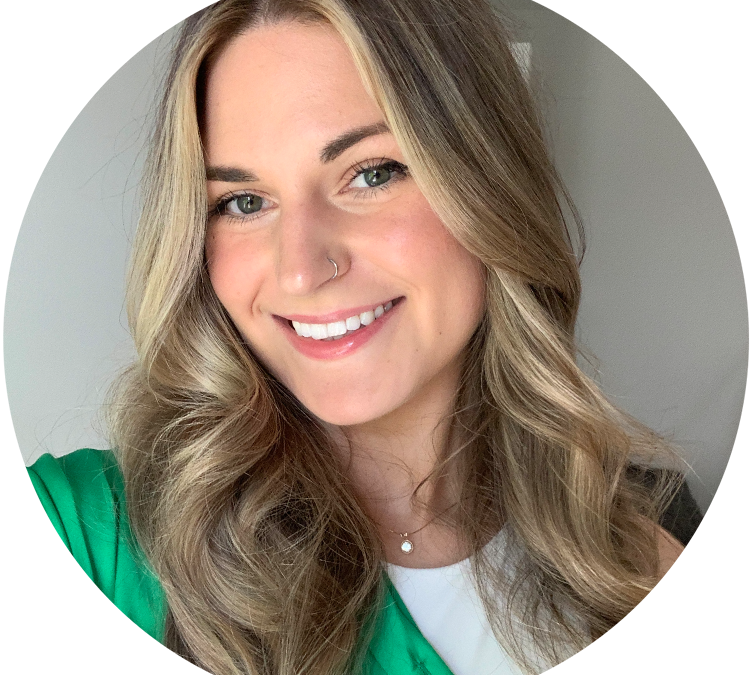
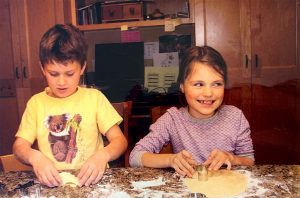
A very well written and thoughtful article about a topic that is not discussed enough. Promoting the rights of people with disabilities is an ongoing effort that requires the commitment of individuals, communities, organizations and governments. This article does a wonderful job of raising awareness about the challenges and issues faced by people with disabilities and promotes public awareness. It is clear that this article was written with a lot of research behind it, but also a lot of personal experience. Well done!